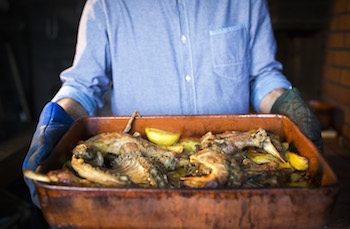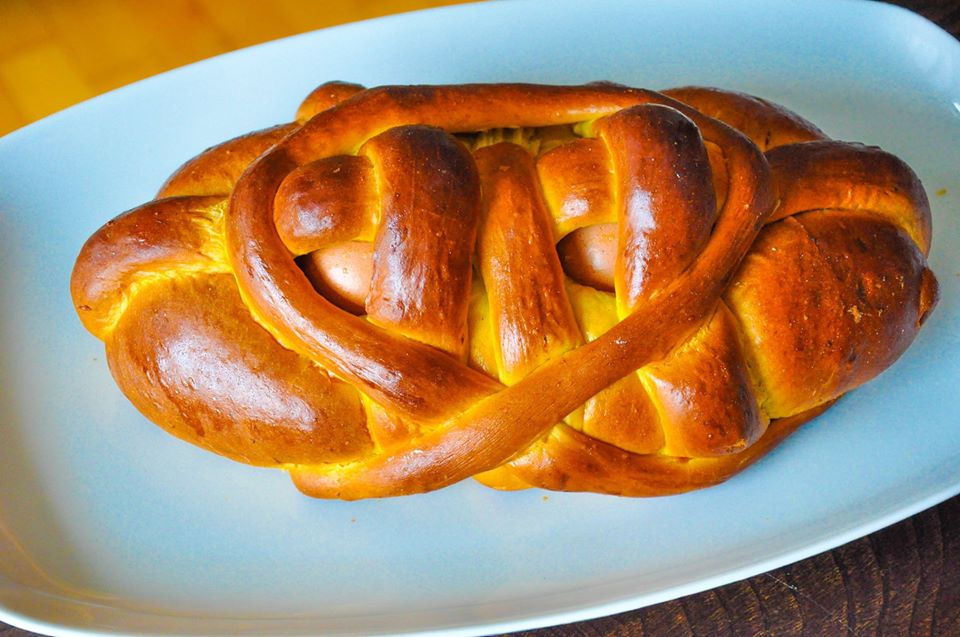Taste of Lisboa at Home: Traditional Portuguese Easter Recipes

If you celebrated Easter, we hope you had a lovely Easter Sunday!
Yesterday, following our very own tradition, we were live on Instagram to bring a little bit of the taste of Portugal to you, even if in the distance. Apart from our usual Taste of Lisboa at Home session, at 7PM local time, we did an impromptu live to share with you typical Portuguese Easter lunch. Our born and bred host Catarina opened a virtual door into her family’s home. We got to meet her mom, who was doing some really enticing cooking, and we also got to learn more about typical Portuguese foods for this occasion.
As several followers asked us for Portuguese Easter recipes after the Instagram live, we asked Catarina’s mom to share with us her lamb recipe, which you are welcome to make any time of the year! Here it is:
PORTUGUESE EASTER LAMB WITH OFFAL RICE
Cabrito Assado com Arroz de Miúdos

Ingredients for the lamb:
Lamb
Garlic
Onions
Salt
Pepper
Cumin
Thyme
Bay leaf
Rosemary
Paprika
Olive oil
White wine

Ingredients for the rice:
Short grain rice (Portuguese Carolino rice preferred)
Liver
Olive oil
Salt
Pepper
Recipe:
On the eve of serving, season the lamb with garlic, onion, salt, pepper, cumin, thyme, bay leaf and rosemary, pour olive oil and white wine on top and let it marinate. On the following day, roast it in the oven at 180°C.
When the meat is almost done, add small potatoes and laminated onions seasoned with olive oil, salt, pepper, paprika, thyme and rosemary. Keep checking how the roast is progressing, and if the ingredients are getting dry, feel free to add a little more white wine during the cooking process.
Meanwhile, make the rice following these steps. Sautée the cut up liver with onions, salt, pepper and olive oil. When they are almost done, add in Carolino rice and water: for one portion of rice, add in two portions of water. When the rice has absorbed the water, transfer it to an oven tray and place it in the oven so that the top layer is slightly roasted.
You’ll know when your roast is done simply by pricking the lamb with a meat fork. Make sure it’s cooked all the way through before serving and enjoy a comforting meal paired with your choice of red wine.
PORTUGUESE EASTER BREAD
Folar

You can’t have a beautiful Portuguese Easter lunch (or any other Portuguese meal, for that matter!) and not end it on a sweet note. For Easter, here in Portugal, we eat a typical sweet bread called folar. While most families these days would purchase a folar from a pastry shop, you can also easily make it at home following this recipe.
Ingredients:
4 raw eggs
2 boiled eggs (do not peel them)
500g all purpose flour
200ml milk
100g sugar
80g butter
25g baker’s yeast
2tsp cinnamon powder
1tsp anise powder
1tsp salt
Recipe:
Put the baker’s yeast into warm milk and mix until it’s dissolved. On a separate bowl, beat 3 eggs and add the previous milk and yeast mixture in here as well.
Place your ball of dough inside a bowl and cover with a tea towel. Let it rest until it has doubled in size – this should take around 60 minutes, but it all depends on the temperature of your kitchen.Once the dough has risen, dust your working area with a little flour so that the dough won’t stick to it. Save a little bit of your dough to decorate your sweet bread. With the main portion of the dough, shape your folar like a slightly flattened ball or egg. With your fingers, make 2 holes, where you will place the already boiled eggs. You can add the fun touches to your bread with the remaining dough. Make strings and place them around the boiled eggs, pressing slightly so that they stick to the rest of the dough. After shaped, put your folar in a baking tray and let it rise for at least 30 more minutes, in a warm place.
Preheat the oven at 200º C. Brush your bread with beaten egg and cook for about 30 minutes, until it is golden. Enjoy!
Do you wish to learn how to cook more Portuguese typical recipes? Here you have some to follow:
Bacalhau à Brás (codfish at Brás style)
Amêijoas à Bulhão Pato (clams at Bulhão Pato style)
Açorda de camarão (shrimps Açorda)
Feed your curiosity on Portuguese food culture:
Lisbon and its sustainable way of living
Foods you didn’t know were Portuguese
Travel around Portugal in 18 foods (without leaving Lisbon)
Real people, real food. Come with us to where the locals go.
Signup for Taste of Lisboa’s next food & cultural experiences
Follow us for more at Instagram, Twitter e Youtube
